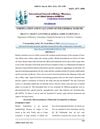 18 citations,
October 2013 in “EFSA Journal”
18 citations,
October 2013 in “EFSA Journal” Coriander seed oil is safe for healthy adults at up to 600 mg per day.
 21 citations,
January 2022 in “Pharmaceutics”
21 citations,
January 2022 in “Pharmaceutics” Colchicine might help treat different skin diseases, but more research is needed to confirm its effectiveness and safe dosage.
 February 2024 in “International journal of biology, pharmacy and allied sciences”
February 2024 in “International journal of biology, pharmacy and allied sciences” The polyherbal hair oil effectively treats various hair problems and promotes hair health.
15 citations,
April 2011 in “The journal of investigative dermatology/Journal of investigative dermatology” A3B5 can reduce skin pigmentation and slow melanoma growth.
 1 citations,
April 2023 in “Science Advances”
1 citations,
April 2023 in “Science Advances” High levels of ERK activity are key for tissue regeneration in spiny mice, and activating ERK can potentially redirect scar-forming healing towards regenerative healing in mammals.
 39 citations,
September 2016 in “Expert Opinion on Drug Delivery”
39 citations,
September 2016 in “Expert Opinion on Drug Delivery” New drug delivery methods can make natural compounds more effective and stable.
 January 2004 in “Side effects of drugs annual”
January 2004 in “Side effects of drugs annual” Certain skin drugs and topical agents, including some natural extracts and fragrances, can cause allergic reactions. Some hair dyes and extensions, as well as minoxidil, a hair growth treatment, can also cause allergies. Botulinum toxin A can effectively reduce sweat but may have temporary side effects.
 40 citations,
January 2018 in “Pharmaceutics”
40 citations,
January 2018 in “Pharmaceutics” Eucalyptol and oleic acid in nanoemulsions improve minoxidil delivery to hair follicles, potentially enhancing hair loss treatment.
 2 citations,
March 2023 in “Experimental neurology”
2 citations,
March 2023 in “Experimental neurology” Pregnenolone might help manage movement issues caused by Parkinson's disease treatment without reducing the medicine's effectiveness.
 17 citations,
April 2007 in “Kidney international”
17 citations,
April 2007 in “Kidney international” Vitamin D boosts a specific gene activity in kidney cells that could improve heart and kidney function.
 15 citations,
April 2020 in “Journal of Dermatological Treatment”
15 citations,
April 2020 in “Journal of Dermatological Treatment” Minoxidil and finasteride work best for hair loss; more research needed.
 25 citations,
September 2018 in “Scientific Reports”
25 citations,
September 2018 in “Scientific Reports” Morroniside may help hair grow and stay in its growth phase by affecting certain cell signals.
5 citations,
February 2019 in “Neuroscience letters” Hormones during puberty increase certain receptors in the brain, and this change is influenced by estrogen levels.
 January 2024 in “bioRxiv (Cold Spring Harbor Laboratory)”
January 2024 in “bioRxiv (Cold Spring Harbor Laboratory)” The gene Ascl4 is not necessary for the development of hair, teeth, or mammary glands.
 6 citations,
April 2019 in “Journal of Cosmetic Dermatology”
6 citations,
April 2019 in “Journal of Cosmetic Dermatology” Hair loss affects women's self-esteem; treatments like minoxidil can help.
 43 citations,
February 2020 in “Clinica chimica acta”
43 citations,
February 2020 in “Clinica chimica acta” Nano-sized plant-based chemicals could improve cervical cancer treatment by being more effective and causing fewer side effects than current methods.
 December 2024 in “Biomedical & Pharmacology Journal”
December 2024 in “Biomedical & Pharmacology Journal” Hair Tonic A, with white tea extract, is better for improving hair health.
January 2025 in “Pharmaceuticals” Nanocarriers can improve antioxidant delivery to the skin but face safety and production challenges.
 17 citations,
August 2007 in “Bioorganic & Medicinal Chemistry Letters”
17 citations,
August 2007 in “Bioorganic & Medicinal Chemistry Letters” A compound made by Pfizer can potentially stimulate hair growth and reduce oil production, making it a good candidate for topical use.
277 citations,
February 2013 in “Science Signaling” Mitochondrial reactive oxygen species are essential for skin and hair development.
7 citations,
July 2013 in “InTech eBooks” Oral lichen planus is a chronic disease causing mouth discomfort and sometimes needs immunosuppressive treatment.
 72 citations,
January 2001 in “Drugs”
72 citations,
January 2001 in “Drugs” Minoxidil and finasteride treat hair loss; more research needed for other options.
 96 citations,
September 2021 in “International Journal of Molecular Sciences”
96 citations,
September 2021 in “International Journal of Molecular Sciences” Chitosan, a natural substance, can be used to create tiny particles that effectively deliver various types of drugs, but more work is needed to improve stability and control of drug release.
 7 citations,
March 2022 in “Molecules”
7 citations,
March 2022 in “Molecules” 5-Bromo-3,4-dihydroxybenzaldehyde could potentially help hair growth by activating certain cell pathways and inhibiting others.
 December 2022 in “Journal of applied biological chemistry”
December 2022 in “Journal of applied biological chemistry” Betula platyphylla extract, particularly the H3-2 fraction, may help treat hair loss by promoting cell growth and inhibiting a hair loss-related enzyme.
 August 2022 in “International journal of research in pharmacy and chemistry”
August 2022 in “International journal of research in pharmacy and chemistry” Teak is a durable, termite-resistant wood with medicinal benefits.
 4 citations,
August 2020 in “Journal of Cosmetic Dermatology”
4 citations,
August 2020 in “Journal of Cosmetic Dermatology” QR 678 and QR678 Neo treatments are effective for hair loss in women with PCOS.
3 citations,
January 2022 in “Journal of neuroendocrinology” Sex hormones affect brain cells differently in males and females.
 March 2024 in “International journal of nanomedicine”
March 2024 in “International journal of nanomedicine” Polymeric nanohydrogels show potential for skin drug delivery but have concerns like toxicity and regulatory hurdles.
 4 citations,
June 2021 in “Powder Technology”
4 citations,
June 2021 in “Powder Technology” Granules improve hair loss treatment by targeting follicles.
























